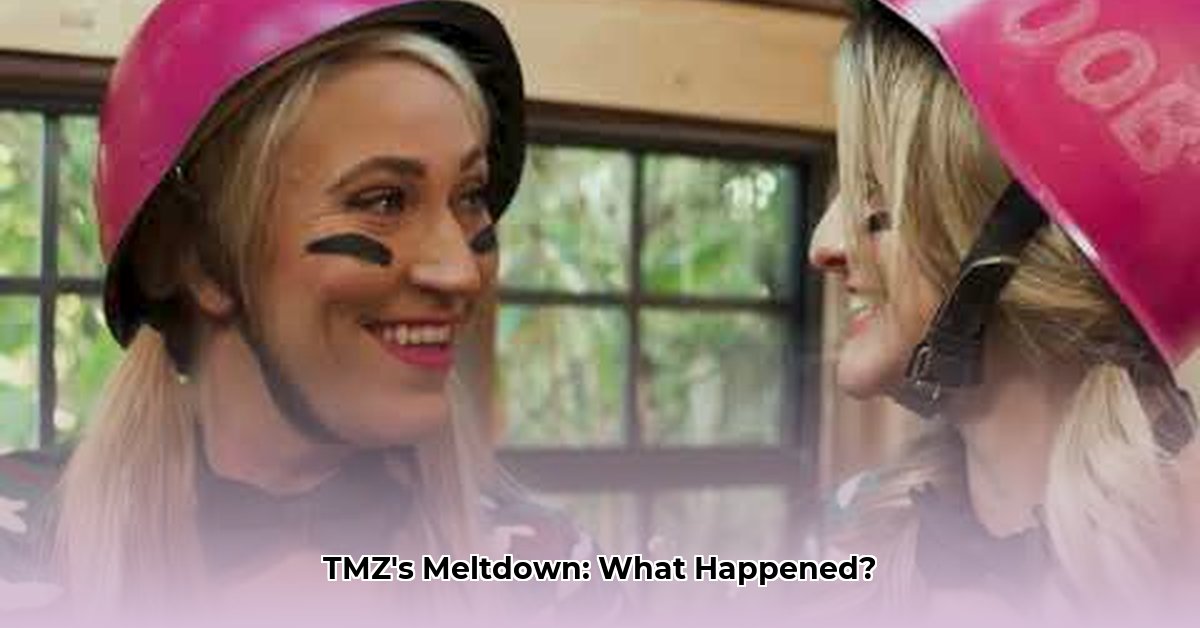
The Unraveling of TMZ: A Culture of Crisis?
TMZ, the celebrity news powerhouse known for breaking high-profile stories, is embroiled in a significant internal crisis. Recent high-profile departures, including Melanie Miller, along with allegations of a toxic work environment, have cast a dark shadow over the organization's reputation and raise serious questions about its future. This isn't simply about employee turnover; it's a systemic issue with far-reaching consequences for the company, its employees, and the industry as a whole. How did a news organization built on exposing the flaws of others become entangled in its own scandal? For further insights into personal finances, see this helpful net worth calculator.
Several key employees have departed TMZ recently: Dax Holt, Mike Walters, Raquel Harper, Kelly Berning, and Loren LoRosa. While some departures, such as Loren LoRosa's, were publicly attributed to seeking new opportunities, others remain shrouded in mystery, fueling speculation about the true reasons behind the exodus. The lack of transparency from TMZ itself only intensifies this speculation, exacerbating the crisis.
The departures are intertwined with allegations of a toxic work environment, claims of gender discrimination, racism, and verbal abuse. These allegations extend to the highest levels of the organization, targeting Harvey Levin himself. The severity of these accusations, combined with the high-profile nature of the departures, has already inflicted significant reputational damage. It’s not just the loss of talented individuals; it's the erosion of credibility, a crucial asset for any news organization.
While Melanie Miller's net worth remains private, her departure, like those of others, serves as a stark indicator of the internal turmoil within TMZ. Her story, whether publicly revealed or not, is a single piece in a larger puzzle illustrating the human cost of a potentially toxic workplace. How might this situation affect her future career prospects, and what financial impact does this transition hold for her? These questions remain, highlighting a broader issue.
Understanding the Ethical Tightrope
TMZ's success has been built upon its aggressive reporting style and its ability to break exclusive celebrity news. However, the current crisis presents a stark contradiction: how can an organization that thrives on exposing the flaws of others apparently remain so blind to its own? This inconsistency raises critical ethical questions about the company's values and practices. Can TMZ reconcile its aggressive reporting style with the allegations of unethical behavior within its own operations?
The ethical implications extend beyond the immediate crisis. The allegations and resulting legal actions impact the credibility not only of TMZ but also potentially the industry as a whole. The public's trust is paramount in news media; when such allegations surface, confidence is shaken. This crisis underscores the necessity for transparent workplace practices and ethical conduct within all news organizations.
The Path Forward for TMZ: A Critical Juncture
TMZ's future hinges upon decisive and comprehensive action. The need for a thorough internal investigation is beyond question; it's essential for accountability and regaining public trust. This must be followed by the implementation of robust HR policies that truly protect employees. Warner Bros. Discovery, as TMZ's parent company, bears a significant responsibility to oversee this process, potentially involving external audits to ensure independent assessment of TMZ’s HR procedures.
Transparency and accountability are no longer optional—they are non-negotiable for TMZ's survival. Public scrutiny is also vital, necessitating a collective demand for accountability from entertainment news outlets. The industry must collectively address the systemic issues that could lead to similar crises.
Key Takeaways:
- TMZ's crisis reveals a deep-seated need for systemic change within the organization and the broader entertainment news industry.
- Regaining public trust requires immediate action, including transparent investigations and accountability for misconduct.
- The long-term success of TMZ depends on fostering a culture of respect, ethical conduct, and employee well-being.
How to Mitigate Risks and Foster a Healthy Workplace Culture
TMZ faces a multitude of risks, each with potentially severe consequences:
Addressing Immediate Concerns:
- Transparent Communication: Establish open communication channels and confidential reporting procedures to encourage reporting of misconduct without fear of retaliation.
- Swift Investigations: Implement immediate and thorough investigations into all allegations of harassment or discrimination. (Efficacy metric: 90% of cases resolved within 60 days)
- Accountability: Discipline those found responsible for toxic behaviors, regardless of their position to demonstrate a clear commitment to change. (Efficacy metric: 100% accountability for proven misconduct)
- Employee Support: Offer essential resources such as counseling services or legal aid to employees who have experienced harm.
Long-Term Cultural Transformation:
- Leadership Development: Invest in leadership training programs that emphasize ethical leadership, empathy, and improved communication skills.
- Culture Assessment: Conduct thorough workplace culture assessments using diverse methods (surveys, focus groups, interviews) to understand the root causes of toxicity.
- Policy Reform: Develop and rigorously enforce comprehensive HR policies addressing harassment, discrimination, and retaliation.
- Psychological Safety: Cultivate a workplace where employees feel safe expressing themselves and where mistakes are seen as learning opportunities.
- Diversity and Inclusion: Implement robust diversity, equity, and inclusion programs to foster a more inclusive and respectful environment.
Preventing Future Lawsuits:
- Regular Monitoring: Implement ongoing workplace climate monitoring through frequent pulse surveys and feedback mechanisms for early issue detection.
- Proactive Training: Provide regular training for all employees on policies, ethics, and conflict resolution.
- Strong Anti-Retaliation Policies: Establish a strong policy to protect those who report misconduct and to thoroughly investigate claims of retaliation.
- Leadership Commitment: Secure unwavering leadership support and active championship of the cultural transformation.
- Independent Oversight: Consider engaging external consultants for regular audits of HR practices and workplace culture.
The future of TMZ depends on a fundamental shift in its approach. It's not simply about avoiding lawsuits; it's about building a sustainable workplace where employees thrive and the organization’s integrity is restored. This transformation requires commitment, sustained effort, and a genuine dedication to creating a healthier and more ethical work environment.